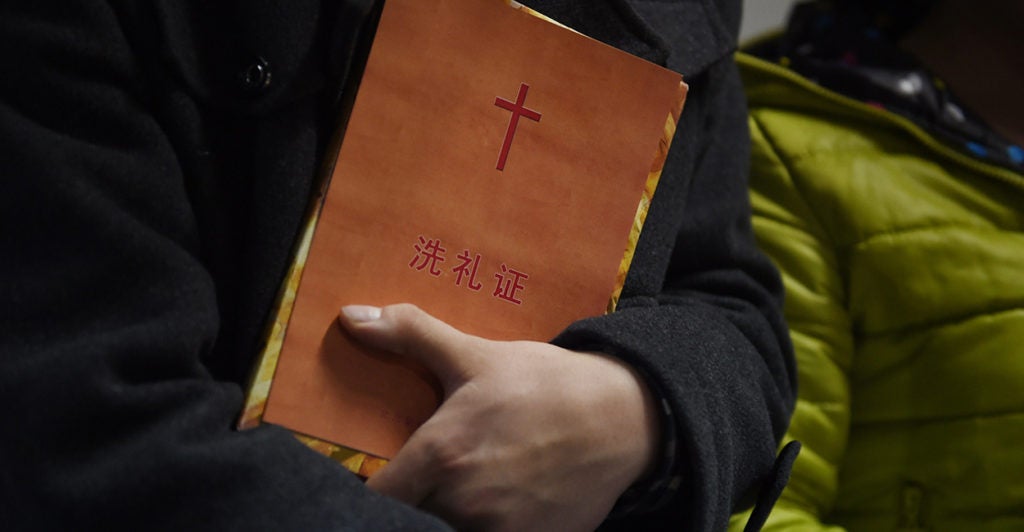Wang Yi, a renowned Christian pastor in China, was quietly sentenced on Monday to nine years in prison, stripped of his political rights for three years, and fined 50,000 yuan.
His sentence is harsh and symptomatic of a broader crackdown in China on Christians and people of all faiths.
Wang was taken into custody just before Christmas last year as the Chinese Communist Party began a new crackdown on religion. His arrest came on the heels of the government shutting down three large, unregistered churches, including Wang’s congregation, Early Rain Covenant Church in Chengdu.
Wang was taken into custody along with his wife and more than 100 of Early Rain’s congregants. Except for Wang, all others were eventually released.
Now, a little more than a year in custody, Wang has been charged by the Chengdu Intermediate People’s Court with “illegal business operations” and “inciting subversion of state power.” The latter is a charge frequently brought in order to silence perceived political opponents in China.
Such politically motivated charges are especially pernicious because they often come with the deprivation of political rights, meaning the prisoner cannot vote or be elected, or exercise the freedoms of speech, assembly, and press, among other restrictions.
Knowing the character of the Chinese regime, Wang wrote a letter last year titled “My Declaration of Faithful Disobedience” and gave it to his congregation to publish were he ever to be imprisoned.
The letter is both a defense of his faith and his actions, and is summarized in this excerpt:
The Bible teaches us that, in all matters relating to the gospel and human conscience, we must obey God and not men. For this reason, spiritual disobedience and bodily suffering are both ways we testify to another eternal world and to another glorious King.
This is why I am not interested in changing any political or legal institutions in China. I’m not even interested in the question of when the Communist regime’s policies persecuting the church will change. Regardless of which regime I live under now or in the future, as long as the secular government continues to persecute the church, violating human consciences that belong to God alone, I will continue my faithful disobedience. For the entire commission God has given me is to let more Chinese people know through my actions that the hope of humanity and society is only in the redemption of Christ, in the supernatural, gracious sovereignty of God.
According to Bob Fu, founder of ChinaAid, an organization that assists the persecuted church in China, “Pastor Wang’s nine-year sentence represents the harshest persecution of an ethnic Chinese house church pastor in more than a decade. … [T]he Chinese Communist Party is trying to send a chilling signal to the already-persecuted Christian community in China that unless you’re silent on the face of the evil regime, you are going to be put in jail.”
Early in 2018, China’s President Xi Jinping and the Chinese Communist Party put in place new regulations on religious activity in an effort to “Sinicize” or secularize religion to conform to the Chinese Communist Party’s precepts. These regulations and the principle of Sinicization have amplified China’s already-severe persecution of religious groups.
For Christians, churches in China have been shuttered and pastors and congregants imprisoned—some even killed, like Li Baiguang. For Catholics, the Vatican has capitulated to Beijing’s demands to share control over the appointment of bishops in China. For Muslims, more than 1 million Uighurs have been arbitrarily detained in political reeducation facilities, and other Muslims are facing increasing persecution.
For Buddhists, Tibetans continue to face restrictions on religious practice and the use of the Tibetan language. For Falun Gong, members of the group face various forms of persecution, and some have even allegedly had their organs harvested.
People of all faiths are enduring persecution at the hands of the Chinese Communist Party, which seeks to eliminate the political threat it sees from religious practice.
China’s severe threats to religious freedom merit a response. The U.S. government should consider ways that it can strengthen its response to threats to religious freedom around the globe.
As advocated in a recent Heritage Foundation paper, the U.S. should make ample use of its human rights-based sanctions authority to hold government officials accountable for violating religious freedom. The U.S. government should also continue to shine a spotlight on China at the annual Ministerial to Advance Religious Freedom.
These and other steps should make up part of the response to Wang’s unjust sentencing, and the broader religious freedom violations taking place in China.
